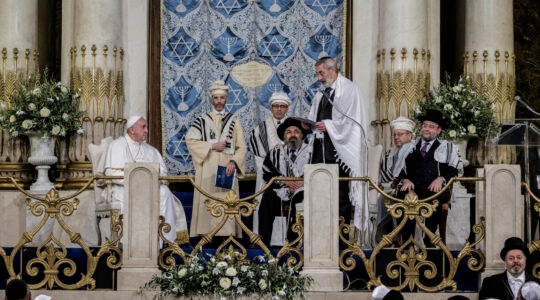(JTA) — Rabbi Neil Gillman, professor emeritus of Jewish philosophy at the Jewish Theological Seminary of America and one of the premier theologians in the Conservative movement, has died. He was 84.
His death was announced Friday by the Rabbinical Assembly.
The author of numerous books, including, in 1991, “Sacred Fragments: Recovering Theology for the Modern Jew,” Gillman was associated for over 50 years with JTS, the main seminary of the Conservative movement, as a student, administrator and member of the faculty, emphasizing the intersection of Jewish theology, Conservative Judaism and Jewish education.
“Gillman’s innovative thinking about how to construe Jewish faith and how to justify it, his use of anthropology as well as philosophy in approaching questions of God and life after death, and his ability to combine complete intellectual openness and honesty with a commitment to Jewish tradition mark his work as truly important, indeed, a real gift to Jews and non-Jews alike,” Elliot Dorff, the Sol & Anne Dorff Distinguished Service Professor in Philosophy at American Jewish University, said in introducing a collection of essays released in Gillman’s honor in 2013.
A native of Quebec City, Gillman graduated from McGill University in 1954, was ordained at JTS in 1960 and received his PhD in philosophy from Columbia University in 1975, according to JTS.
He wrote a regular “Sabbath Week” column for the Jewish Week newspaper in New York, and was a member of the advisory committee of Sh’ma, an influential newsletter on new trends in Jewish thought and practice.
He served on the Commission on the Philosophy of Conservative Judaism, which produced Emet Ve’Emunah, released in 1988 and considered the first common statement of principles in the Conservative movement’s then 143-year history.
Conservative Judaism magazine dedicated its fall/winter 2008–2009 issue to him in honor of his retirement.
In addition to “Sacred Fragments,” which won the 1991 National Jewish Book Award in Jewish Thought, he was the author of “Conservative Judaism: A New Century”; “The Jewish Approach to God: A Brief Introduction for Christians”; and “Traces of God: Seeing God in Torah, History, and Everyday Life.”
In his 2004 book “The Way Into: Encountering God In Judaism,” he described Judaism’s notion of a personal God.
“The personal God lives in a dynamic, ever‑changing relationship with people; the impersonal god knows nothing of relationships,” he wrote. “This metaphor of a personal God is concretized in the many more specific biblical metaphors for God: God is a shepherd, a parent, a teacher, a lover, a sovereign, a judge, a spouse. These are all relational qualities: a shepherd needs sheep, a sovereign needs subjects, a lover needs a beloved. They all capture the sense that God is personally and intensely involved in relationships with people.”
JTA has documented Jewish history in real-time for over a century. Keep our journalism strong by joining us in supporting independent, award-winning reporting.





